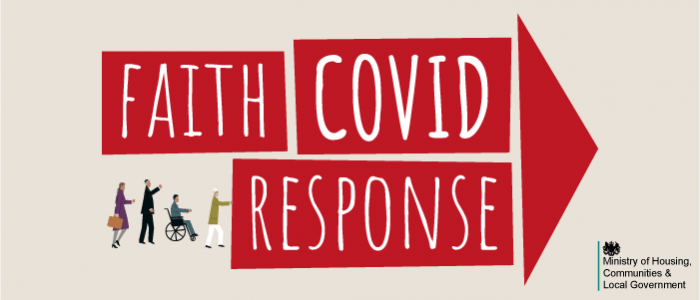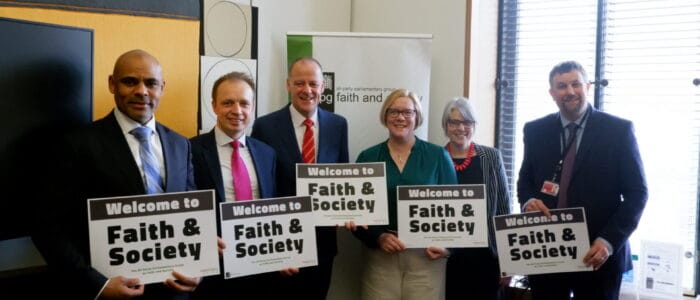Faith COVID Response Project Update

At FaithAction, we have been working very hard during the last three months to reach faith communities up and down the country and feed their ideas, needs, and opinions back to government as the situation changes; as restrictions have been lifted, as different religious festivals come and go, and as local lockdowns are being imposed in different parts of the country.
After eight weeks of numerous focus groups, surgery calls, one-on-one phone calls, and joining various interfaith roundtables and webinars, we wanted to give you a quick 3-point summary of some of the main points of interest we have heard from each faith community recently.
If you spot something obvious that’s missing, or a point you disagree with, let us know! We inevitably cut out and generalise a lot in selecting just three points for each focus group, but it might be that your need, opinion, or way of doing things hasn’t been brought up in our focus groups yet.
If it’s important to you – let us know! You can register for the next focus group by either clicking the heading of each section below, or by visiting our website and registering your interest and one of the team will get back to you.
We also have a women’s multifaith group. If you’d rather join that, you can register here.
- As with many other faith groups, some Baha’i participants raised the restrictions placed on funerals as being particularly difficult for their community, especially in the earlier days of the lockdown. They normally cook for, feed, and support the bereaved and have been unable to do that in the same way. Many are concerned about big mental health problems going forward as a result.
- Jains benefitted greatly from places of worship being allowed to open for private prayer. Since restrictions loosened further, however, many have found that attendance was high when they first reopened, but numbers have dropped since. Safety restrictions currently make in-person meetings less appealing.
- The only Zoroastrian temples are in London. They have been broadcasting services online, and Zoroastrians around the country are praying at home.
- Most Buddhist communities we have heard from are not opening their temples or retreat centres in the near future, likely not until 2021 or whenever a vaccine becomes available.
- The main inhibitors have been the small size of many temples making social distancing impossible, and the opinion that the risk of coming back together still outweighs the benefits, particularly with a high proportion of elderly and BAME members in many Buddhist communities.
- Online worship has been particularly effective, especially in strengthening international networks. However, chanting is not possible online, which is quite a significant practice for many.
Christian
- Most churches are still not open, although an increasing number of churches have started to open up. Many are considering September/October as a potential reopening time.
- Many churches that have opened have expressed that after an initial surge of attendance, numbers have tailed off after a couple weeks.
- Singing and full immersion baptism remain practices of critical importance to most churches. Last Friday saw singing in choirs become permissible (though congregational singing is still not permitted at this point) and we are expecting an update on the guidance around baptism to be coming soon.
Hindu
- Financial concerns have been raised throughout our focus groups with Hindu communities. It is feared that many small temples might not survive this period of decreased donations due to being closed.
- Many temples that are open have been limiting visits to 5-10 minutes per household so as to allow as many as possible to visit safely throughout the day.
- In normal times, many Hindu temples expect uniquely large numbers of attendees, particularly during festivals such as Krishna Janmashtami, which just passed. Many measures, such as pre-booking, short visits, one-way systems, and clear markings around the temples have been put in place to ensure social distancing is maintained. Nonetheless, celebrations have had to be severely curtailed, with numbers limited as usual, aarti and prayers played from a CD rather than being sung live, and no food being served.
Jewish
- As with Churches, for those synagogues that have reopened, many have seen a decline in attendance after a couple of weeks.
- Some of the main things we have heard stated as hindering people from returning to synagogues is the lack of childcare provided during many services and the inability to socialise with others in the community outside of one’s household.
- Many rabbis have also expressed a high level of burnout and fatigue due to the rate at which they are having to work and the pressure they feel they are under.
- Most mosques we have spoken to are only open for Friday prayer for the time being.
- Local lockdowns are understood and accepted, generally speaking, but there was frustration in the North about the timing of local lockdowns being announced just before Eid al-Adha celebrations.
- Online worship has worked well for many, especially those who are vulnerable or lonely, but as with other faiths, few have found it a sufficient replacement for in=person worship.
Sikh
- Many gurdwaras have been operating foodbanks and serving langar to their local communities.
- As with several other religions, singing continues to be sorely missed.
- Larger gurdwaras are mostly open at this point with one-way systems, sanitising stations, and other safety measures in place, which allow people to make their way through the building and pay their respects to the Guru Granth Sahib without stopping or interacting with other households.
*We appreciate the unique needs and valuable contributions of each of these faith groups and convey that clearly in our reporting to government, but due to small numbers of participants, we have combined the focus groups for these three minority faiths.


